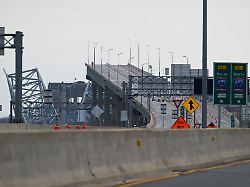The Port of Baltimore could be at a standstill for weeks following the collapse of the Francis Scott Key Bridge. The port is of considerable importance for the shipping of cars, including for German companies. Coal and liquid gas are also transported from there.
The global economy has had to deal with a series of shocks in the tightly scheduled global supply chains in recent years and is now having to contend with a new shock: After a huge container ship rammed the Francis Scott Key Bridge in Baltimore and caused it to collapse, An important port on the US east coast is paralyzed and a highway connection is interrupted.
The bridge spanned the entrance to the ninth largest port in the country. Although Baltimore is not a large container port – according to Bloomberg, it accounts for about three percent of total trade on the East and Gulf Coasts – it is where most of the cars in the USA are handled. Around 750,000 cars were shipped through Baltimore last year – manufactured by American and European companies such as General Motors, Ford, Volkswagen, BMW and Mercedes. Baltimore is also important for the transport of coal, gypsum and lumber. Half a million tons of liquefied gas leave the port every month.
Last year, the port’s total trade volume was around 47 million tons of goods worth about $80 billion. That means, mathematically, that for every day that Baltimore is closed, $217 million worth of goods go unhandled. How long the disabilities last is unclear. But it could take several weeks or even months before the port can be fully used again. According to authorities, maritime traffic through the port has been suspended “until further notice.”
U.S. Transportation Secretary Pete Buttigieg said there is no question that the Baltimore shutdown will have a significant and long-lasting impact on supply chains. President Joe Biden said the US government would “move heaven and earth” to open the port and repair the bridge as quickly as possible. But that will “take some time”.
Big traffic jams
Logisticians hope that the bottleneck will be local and will not completely disrupt supply chains. This is mainly because companies can reroute their freight. Some have already announced that they will switch to other US ports for exports and imports. Not only ports on the east coast from Miami to Boston are eligible. In order to avoid bottlenecks there, they are also keeping an eye on the west coast, such as Los Angeles.
However, this means: significantly longer transport routes and therefore higher costs. The country’s second-largest port for auto carriers is in Brunswick, Georgia – about 700 miles south of Baltimore.
For companies and consumers, an experience from the corona pandemic could be repeated, which was mainly caused by lockdowns in China: a sudden, significant increase in freight volume is enough to overwhelm a port’s handling capacity. This leads to massive traffic jams of waiting ships and ever greater delays in transport.
The bridge collapse will have a limited impact on the overall economy, said Mark Zandi, chief economist at Moody’s Analytics. But it shows how vulnerable the country’s infrastructure and supply chains are.
